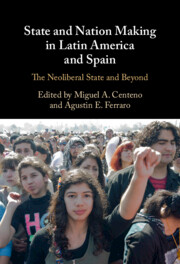
- Publisher:
- Cambridge University Press
- Online publication date:
- August 2023
- Print publication year:
- 2023
- Online ISBN:
- 9781108873031
Last updated 10th July 2024: Online ordering is currently unavailable due to technical issues. We apologise for any delays responding to customers while we resolve this. For further updates please visit our website https://www.cambridge.org/news-and-insights/technical-incident


Neoliberalism is often studied as a political ideology, a government program, and even as a pattern of cultural identities. However, less attention is paid to the specific institutional resources employed by neoliberal administrations, which have resulted in the configuration of a neoliberal state model. This accessible volume compiles original essays on the neoliberal era in Latin America and Spain, exploring subjects such as neoliberal public policies, power strategies, institutional resources, popular support, and social protest. The book focuses on neoliberalism as a state model: a configuration of public power designed to implement radical policy proposals. This is the third volume in the State and Nation Making in Latin America and Spain series, which aims to complete and advance research and knowledge about national states in Latin America and Spain.
‘For years, scholars and pundits presumed that neoliberalism meant dismantling the modern state’s involvement in economic and social affairs, and that Latin America was a laboratory for the global roll-back to free markets and civil society. The authors and editors of this book dispel thatmyth. They show how important the state was to the remaking of social relations. This volume is a major contribution to our understanding of the history of globalization.’
Jeremy I. Adelman - Henry Charles Lea Professor of History,Princeton University
‘This volume unites a stellar group of authors to produce the most comprehensive and detailed analysis of policy making in the Iberian world, across countries and sectors, during the neoliberal era.’
Andreas Wimmer - Lieber Professor of Sociology and Political Philosophy,Columbia University
‘This book is the best and most comprehensive investigation of the neoliberal state in Latin America. Its all-original essays show that neoliberalism hardly entailed the termination of state intervention. Rather, the neoliberal state used government planning, concentrated power,and technocratic isolation to liberalize trade and finance in support of export-led growth.’
James Mahoney - Gordon Fulcher Professor in Decision-Making and Professor of Sociology and Political Science at Northwestern University
 Loading metrics...
Loading metrics...
* Views captured on Cambridge Core between #date#. This data will be updated every 24 hours.
Usage data cannot currently be displayed.